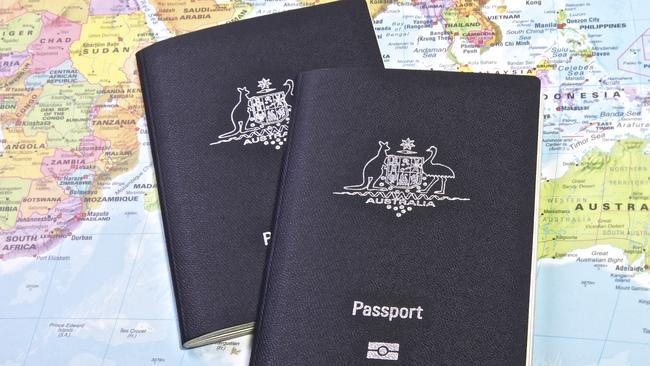
One evening last week, I was chatting with a taxi driver and he told me he didn’t know his way around Melbourne because he had only been driving two weeks. He had come from India to Perth initially, but decided there were more opportunities in Melbourne, where he was living with relatives.
In the light of the current debate about whether the government should direct migrants to particular regions, there was a clear message from that conversation — migrants are attracted to cities that are perceived to offer the greatest opportunities.
Maybe I should have told him about Warrnambool, a town that congestion-busting minister Alan Tudge informs us is crying out for workers. I’m pretty sure it wouldn’t have made any difference to my driver’s decision.
The Morrison government’s thought-bubble to direct migrants to Darwin, Adelaide, Hobart or any town whose civic leaders are begging for more people is both harebrained and impractical.
It is the classic look-over-there strategy.
Most members of the government know the annual permanent migrant intake should be reduced and that there should be restrictions on the number of temporary migrants, but there are powerful forces, both bureaucratic and commercial, preventing this sensible outcome.
The idea that our immigration policy settings are optimal is laughable. The government acknowledges this by continually emphasising the annual cap of permanent entrants of 190,000 was undershot by almost 30,000 last financial year. But if a figure of 160,000 is so good, why not make that the cap?
But let’s also have the debate about whether a lower cap again would be appropriate. If Tudge really wants to bust some congestion — and his figures are compelling in terms of the increasing delays faced by residents of Melbourne, Sydney and southeast Queensland when driving and using public transport — he must significantly reduce the number of migrants.
This is not just about traffic jams and packed public transport. It is also about unsightly, unwelcome overdevelopment in once pleasant suburbs. It’s about overcrowded schools with rows of demountable classrooms taking up what was playing area. It’s about hospitals dealing with soaring patient numbers and a rising number with poor English.
Blaming the states doesn’t cut it. Given the record ramp-up of migrants to Melbourne and Sydney under Coalition policy settings, we can’t deal with these pressures with additional spending on infrastructure (itself often a long-term inconvenience) and services.
The big-Australia boosters will trot out misleading factoids — high immigration generates the tax revenue to offset an ageing of the population. Immigration cannot sustainably affect the age profile of the population unless it is continuously ramped up.
The latest angle in this debate is that all our productivity is generated by big cities. So, if anything, we should allow our big cities to get even bigger through higher immigration rather than direct migrants to the regions.
One proponent of this is Ian Harper, dean of the Melbourne Business School and a member of the board of the Reserve Bank (also a big-Australia supporter): “Migration is right at front and centre here. We benefit an enormous amount from migration. What drives productivity growth is innovation. The source of this creativity is when we are together, when we stimulate each other. The more diverse we are the more creative we are.”
Not that there has been any serious research on this. The idea is that crammed and growing large cities brim full of interaction, creativity and energy, but this needs to be tested. The buzzword is agglomeration, where the clustering of activities leads to investment, high-paid jobs and wealth creation. It sounds very vague because it is. The notion that Melbourne and Sydney have been responsible for 80 per cent of recent productivity growth is just an illusion arising from the fact wages are higher in those two cities than elsewhere.
But that doesn’t mean their residents are better off than those who live elsewhere. Almost everything costs more, particularly housing. And here’s a troubling statistic for the big-Australia/big-city fan club. Over a decade, our annual rate of productivity growth has fallen to just more than 1 per cent. The previous decade it was well above 2 per cent.
If it were the case that the very rapid growth of Melbourne and Sydney held the key to our productivity growth, then it is failing to achieve that.
The government should be wary of getting on the big-city productivity bandwagon. What does this imply for people who don’t live in these urban powerhouses? Evidently they are simply a drag on the economy.
And who needs the mining industry when we’ve got Melbourne and Sydney with their high-rise slums of the future and half-finished infrastructure?
If this line of argument is right, perhaps we should all just pile into one city — let’s say Melbourne. We could shut down the rest of the country. The productivity benefits would be so substantial we’d all be better off. (I might have to leave, mind you.)
You don’t have to be a trained economist to know this is nonsense. We know, for instance, that there is precious little interaction between international students (whose surging numbers have been one of the main drivers of population) and locals. We also know that their English language skills decline while they study here.
It is surely ironic that Tudge himself has highlighted the problem of increasing numbers of residents with no or very poor English. It is estimated there will be about a million residents in this category in a few years.
The government must be courageous and cut the permanent migrant intake now. There is no need to wait until the budget; it can be done at any time. And let the universities know that the number of international student visas will be capped unless they show restraint.
And they can forget this loopy idea of forcing migrants to go to particular regions as some sort of consolation prize. It won’t work and is in any case offensive. If it makes sense for migrants to head towards Adelaide, they will.




To join the conversation, please log in. Don't have an account? Register
Join the conversation, you are commenting as Logout